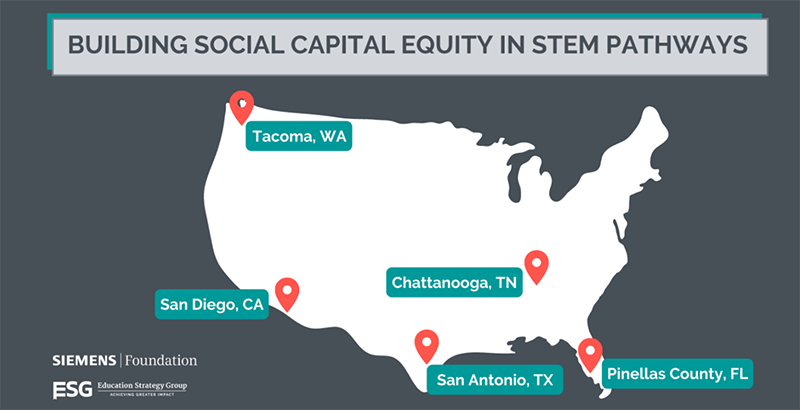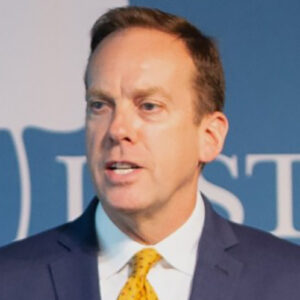Etzwiler & Gandal: Helping Students Build Social Capital — and a Path to the Future
New partnership in 5 cities makes school, workforce and community building centerpiece in ending inequities for kids of color and low-income students

Get stories like this delivered straight to your inbox. Sign up for The 74 Newsletter
When it comes to educational and career success, it’s difficult to overstate the importance of relationships.
No one succeeds alone, and doors to opportunity are not opened solely by academic achievement. Social capital — the benefits and opportunities that stem from personal networks and connections — matters tremendously for success in higher education and careers. But as with more traditional forms of capital, many are not able to access and leverage social capital.
Systemic barriers in the nation’s education and employment systems contribute to these inequities and are especially pronounced for people of color and those without a college degree. Considering that upward of three-fourths of jobs are filled through networking, the importance of helping students from all backgrounds develop robust connections and making sure they know how to use them is clear. Addressing inequities in economic opportunity requires addressing network inequities — and that work must start long before a student begins to consider entering the workplace.
Education Strategy Group and the Siemens Foundation are embarking on a new partnership to build upon existing research on the importance of social capital development for students. This new initiative will support teams in Chattanooga, Tennessee; Pinellas County, Florida; San Antonio, Texas; San Diego; and Tacoma, Washington, as they work to build relationship and network development into the heart of the educational pathways they offer to students — their future workforces.
Each of these communities has made progress in recent years in their commitment to helping students — particularly those who have been historically marginalized — make smooth transitions from high school to postsecondary education so they are ready for well-paying careers. San Antonio, for instance, has seen large increases in college-bound graduates of color enrolling in four-year colleges over the past five years, in large part because of ambitious districtwide college-enrollment goals and an emphasis on increasing participation by these students in advanced coursework such as AP classes. Similarly, Tacoma has built a strategy driven by its ambitious goal that by 2030, 70% of high school graduates will complete a degree, earn a technical certificate or enter high-wage employment within six years. Pinellas County has developed a comprehensive plan to close academic achievement gaps between Black students and their peers, including a focus on participation and success in advanced coursework.
These districts are also leaders in developing new options for their students to get a jump start on college and career success. Hamilton County Schools in Chattanooga has built innovative alternative school choice options like the Gestamp work-based learning program, which allows high school students to learn on the job for a full day at a time. San Diego Unified School District works with local higher education institutions to offer college-level courses to students and develop deep, school-based partnerships like Avenues for Success, which guarantees admission to San Diego State University for students who meet certain criteria.
To take their work to the next level, each of these communities will make social capital a core piece of their student preparation strategies, with a particular focus on STEM fields. K-12 districts will take the lead, supported by local colleges and universities, businesses and other community partners in a collective effort to expand, diversify and mobilize the networks of underrepresented students to better position them for well-paying entry-level STEM employment.
Though the specifics in each location will differ and evolve over time, some of the key strategies communities will explore to help students build robust networks include:
- Teaching networking skills within career pathways. Networking is a skill that needs to be taught. Communities committed to building social capital development into their career pathways should consider ways to teach students how to leverage their “strong ties” — close relationships like family and best friends — and substantially expand and mobilize their “weak ties”—acquaintances, friends of friends and others who can forge connections and create opportunities on their behalf.
- Reimagining the possibilities of work-based learning. In recent years, there has been significant growth in work-based learning, which can give students the invaluable opportunities to apply classroom learning in a real workplace. But learning on the job is about more than just building technical skills. Workplace experiences that foster the growth of professional relationships can give students valuable connections that may one day open doors to employment in a field they might wish to pursue.
- Expanding opportunities for near-peer mentoring. Connections with working professionals are not the only valuable networks. Students’ own near peers — young people who are slightly older and have recently made the transition to higher education and/or work — can offer candid practical advice and serve as indispensable resources. Near-peer mentoring programs, which support to high school students as they navigate the path to postsecondary education and training and employment, can be highly effective in bolstering students’ success and adding to their networks.
Addressing social capital inequities will require systemic changes in how schools, educators and community organizations actively recognize the value of the networks students already have, while facilitating their ability to grow and leverage new relationships. The five communities participating in this new initiative are taking important, concrete steps to make this idea a reality. It’s time to include social capital alongside the quality academic, skill and work experiences that are already established as essential elements of success. By taking a systematic approach to ensuring that social capital-building tools and strategies are core to all pathways, all students can realize their full potential.
David Etzwiler is CEO of the Siemens Foundation. Matthew Gandal is president and CEO of Education Strategy Group.
Get stories like these delivered straight to your inbox. Sign up for The 74 Newsletter

;)

